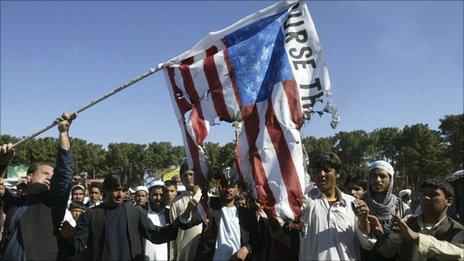Anti-US sentiment is 'rife' in Afghanistan and Pakistan
- Published

Anti-American sentiment has been exacerbated in Afghanistan by reports of the US Koran burning
The deaths of 25 Afghans after nearly a week of anti-American rioting in a dozen cities across the country - coupled with a steady stream of anti-American demonstrations across Pakistan over several issues - signal new challenges for the US-led Western alliance as it tries to stabilise the region and pull its forces out of Afghanistan.
Guest columnist Ahmed Rashid reports from Washington.
The violence in Afghanistan was sparked off by the burning of the Koran in the US. The rioting began in Mazar-e-Sharif when the UN office was ransacked and seven UN officials and guards were brutally murdered.
The demonstrations then spread south to Kandahar where over two days some 13 people were killed. After six days it had spread to the eastern provinces and the capital, Kabul.
There was anger among some Western observers at President Hamid Karzai, who drew attention to the Koran burning. Most Afghans did not know about it until he condemned the burning publicly a few days before the riots started.
However there is also little doubt that the Taliban have taken enormous advantage of the issue in their heartland of southern Afghanistan and it is they who have been whipping up the crowds.
The out-of-control violence comes as the Kabul government is supposed to take charge of some areas of Afghanistan from US forces in July in the transition process that will extend to 2014.
Overwhelming corruption
Whatever the circumstances, there is no doubt that anti-US feeling is growing in the country after a series of appalling incidents.
Frequent visits by US officials to Pakistan have not diluted anti-American rage
Afghan civilians have been repeatedly killed in night raids by US special forces and mis-targeted bombings by US aircraft while a handful of US soldiers have been charged with deliberately killing Afghans and committing other atrocities.
A great deal of public anger and frustration is due to the lack of good governance and overwhelming corruption, which could see the collapse of Kabul Bank - the largest in the country.
The Americans are blamed by Afghans for tolerating the failure of the government to get its act together 10 years after 9/11 and for fuelling corruption by giving money to the wrong contractors.
In Pakistan the case of the alleged CIA agent Raymond Davis - coupled with an acute economic downturn, massive energy shortages, corruption and the blasphemy issue that has led to two senior officials being murdered - has also led to widespread anti-Americanism.
Fast deteriorating
Mr Davis was charged with shooting dead two Pakistani men and remained in a Lahore jail for more than a month before his case was resolved.
Islamist parties have staged numerous anti-US protests in Pakistan
Relatives of the dead Pakistanis accepted "blood money" worth an estimated $2m in exchange for his release - something that the Pakistani legal system allows for.
And while the US drone attacks on the Pakistani border with Afghanistan has claimed many Taliban and al-Qaeda lives it has also claimed the lives of Pakistani civilians.
All these issues have been overly exploited by the well entrenched Islamist parties and their extremist allies as well as by parts of the right-wing media.
In the meantime Afghans and Pakistanis are warning the Americans that there is enormous anti-American rage building up in both countries - and the usual tactics to address this, such as more US aid or more visits by US officials - will do little to reduce it.
In both Afghanistan and Pakistan the domestic security situation is fast deteriorating, their economies are faltering, their governments are seen as corrupt and incompetent and ordinary people cannot see any improvement in their lives.
Logically unrest should be directed at the governments concerned, but the overriding issue for many people is the continuing US and Nato presence in Afghanistan and the over-long war against the Taliban, which has now entered its second decade.
Moreover anti-Americanism is reaching a peak as conspiracy theories abound in both countries on how and when foreign forces will exit, when the US will begin public talks with the Taliban and how it will resolve its tensions with the Pakistani military as the end-game in Afghanistan approaches.
Afghans are deeply divided over talks between the Taliban and the US and Afghan governments. The majority of Pashtuns are in favour but many non-Pashtuns are against any talks with the Taliban at whose hands they suffered so badly in the 1990s. President Karzai has yet to build a national consensus on the issue.
Meanwhile the Pakistani establishment fears that the US will mediate with the Taliban without taking Pakistan into confidence. Islamabad also fears that in a post-war Afghanistan, the US will hand over to India a major role in running the country.
In Washington there is widespread agreement now between all parts of the US government on the need for going public soon about talks with the Taliban.
Secret talks between the US and the Taliban began some six months ago but so far they have not gone very far.
If there is a genuine attempt at peace talks by the Americans, that could go a long way in reducing anti-Americanism in the region, although nobody claims that such talks would be easy.
As long as extremist groups act as spoilers in the peace process or have the ability to whip up anti-Americanism, the situation remains dangerous.
Both countries need an end to the war in Afghanistan, a withdrawal of foreign troops and a US-Afghan-Taliban reconciliation that can heal the deep scars of the past 10 years.
Ahmed Rashid's book, Taliban, was updated and reissued recently on the 10th anniversary of its publication. His latest book is Descent into Chaos - The US and the Disaster in Pakistan, Afghanistan and Central Asia.